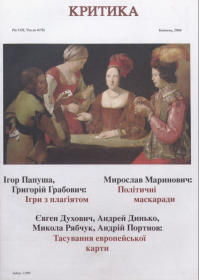Plagiarism and its contexts In Krytyka, No. 4 (78), 2004, pp. 20–27.
Keywords:
Academic ethics, Ukrainian education, corruption, valuesSynopsis
Hrihorii Hrabovych's article provides a critical analysis of the phenomenon of plagiarism in the historical, cultural, and intellectual space of Ukraine. The text is divided into eight parts. At the beginning, the author refers to the case of Oleksandr Tkachuk's Narratological Dictionary, a situation that is indicative of the issue at hand and plays a central role in the proposed review.
In the first parts, Hrabovych outlines general approaches to understanding the concept of “plagiarism,” traces the historical forms of its emergence and the evolution of interpretations in different eras. Particular attention is paid to works from 1990-2000 that explore the impact of new technologies, as well as the cultural and educational characteristics of individual countries on the spread of plagiarism, primarily in the academic environment. Reflection on these studies leads directly to the thematic circle of the two final parts of the article, in which the author analyzes in detail the current state of the problem of plagiarism and practices of unauthorized borrowing in Ukraine.
Based on the case of the Narratological Dictionary, which was completely borrowed by Tkachuk from Gerald Prince's A Dictionary of Narratology, Hrabovych explores the possible causes of such phenomena and the mechanisms that contribute to their legitimization. Among the key factors, he highlights the influence of Soviet intellectual practices, which contributed to the tolerance of poor-quality anti-scientific research and the formation of corresponding models of behavior in educational and scientific environments.
Downloads




